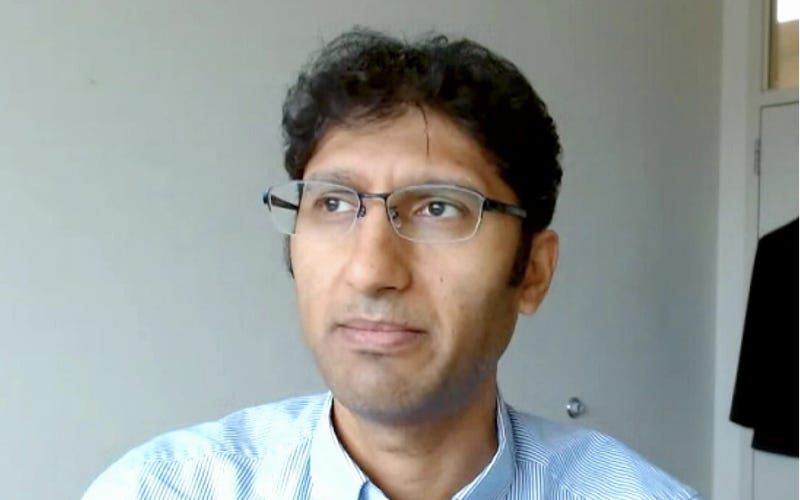Senior Editor At British Medical Journal Speaks Out About COVID-19 Vaccine Safety Concerns
Set Your Pulse: Take a breath. Turn your attention to your body and release any tension. Breathe slowly into the area of your heart for 60 seconds, focusing on feeling a sense of ease. Stay connected to your body as you read. Click here to learn why we suggest this.
If you like our writing, feel free to click the ❤️ so more people can discover us on Substack. We’d also love to hear from you in the comments.
Dr. Peter Doshi, a senior editor at the British Medical Journal (BMJ) and associate professor at the University of Maryland School of Pharmacy has been a voice of reason throughout the pandemic. He's one of what seems to be thousands of scientists and doctors who have been raising a number of concerns regarding ignored important data on COVID-19 vaccines.
These concerns are rarely acknowledged and even known about by the average citizen. Big Tech along with governments are engaged in a massive censorship campaign, and these (COVID-19 vaccine) concerns have been virtually non existent in mainstream media coverage.
Independent media outlets like The Pulse have also been demonetized and censored, and are struggling to stay afloat. If you think the work that we do is important, you can contribute here or here.
In a recent interview with German TV, Doshi expressed this fact, saying that “Our legacy media has not done a good job in providing balanced coverage about the vaccines" and that "we're not getting the information we need to make better choices and to have a more informed understanding of risk and benefit."
“It was very unfortunate, that from the beginning, what was presented to us by public health officials was a picture of great certainty…but the reality was that there were extremely important unknowns. We entered a situation where essentially the stakes became too high to later present that uncertainty to people...I think that's what set us off on the wrong foot. Public officials should have been a lot more forthright about the gaps in our knowledge.”
Dr. Peter Doshi
Doshi was part of an international group of eminent academics and physicians who went back and analyzed safety data from the original clinical trials that were the backbone of the FDA’s decision to authorize the mRNA vaccines in December 2020. It was published in the peer-reviewed journal, Vaccine in September 2022.
The analysis showed that mRNA vaccines were associated with 1 additional serious adverse event for every 800 people vaccinated. This would normally have a vaccine taken off the market, and is in sharp contrast to the idea that serious adverse events are extremely rare as federal health regulatory agencies have commonly claimed with regards to COVID-19 vaccines. The authors also found that the trial data showed that the increase in serious adverse events following mRNA vaccination surpassed the reduction in risk of ending up hospitalized with COVID-19.
“They should immediately be warning people about this safety signal that we found, and they should immediately be replicating our analysis -- the data are indicating there’s increased risk at a level that is much higher than has previously been realized.”
Dr. Peter Doshi
Beyond their analysis, it's important to mention that vaccine injury surveillance and reporting systems around the world have recorded a record number of serious injuries (hospitalizations, deaths, permanent disabilities) that people believe to be a result of COVID-19 vaccines. Multiple papers have emerged explaining the possible mechanisms of action as to why these are occurring. Many of these injuries and safety signals don't seem to be properly investigated, and again, a proper discussion about this topic has not been had.
Even the BMJ was "fact checked" and censored for showing that Pfizer falsified data, unblinded patients, employed inadequately trained vaccinators, and was slow to follow up on adverse events reported in Pfizer’s pivotal phase III trial for COVID vaccines. You can learn more about that here.
Throughout the pandemic, we’ve been told to “trust the science” but Doshi says, “How can one recommend responsibly that these products are based on science if the data are not available? Science is about sharing data. We're in an era of open science, not secret science.”
Doshi and colleagues have written an open letter to the CEOs of the vaccine companies asking for the raw data, but as yet, they have not received a reply.
What Can We Do ?
We seem to be in a constant information war these days. And with that, there appears to be a war on sensemaking. What is sensemaking? Simply, our ability to accurately perceive what is taking place and make meaningful decisions based on what we learn.
It seems now that it is like we are in a dark and chaotic cave, with nothing more than a single match to light our path through a noisy and polluted information landscape. “What is true? How can we even know anymore?” are questions so many of us grapple with. It’s time to get a high powered flashlight!
In this episode we’ll explore what sensemaking, the conversation of fake news, the rise of censorship and perhaps some ideas on how we can improve this important skill both individually and collectively.
Listen to full episodes of the podcast on your favorite podcast source or here.




